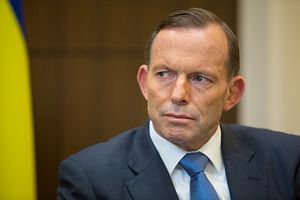Tony Abbott will remain Australia’s Prime Minister after a motion for a leadership spill was defeated Monday morning by 61 to 39 votes. In Australia, any member of a political party can call for a leadership spill. If it successful, the leadership positions are declared vacant and others may seek to fill them. This is how Tony Abbott succeeded former leader Malcolm Turnbull in late 2009, when his party was still in Opposition. Abbott has now asked for six months to improve things. He’s promised to be more consultative after his “near death experience.”
Although Abbott survived today, even those writing for conservative papers have pointed out that a vote against you of 39 is not heartening. Dennis Shanahan in the national broadsheet The Australian has said it is “an almost fatal blow for the prime minister. It is also an almost fatal blow for the Liberal party.”
Western Australian MP Luke Simpkins called for the spill, which was backed by respected Liberals such as Arthur Sinodinos. Many backbenchers have been furious over the prime minister’s many stumbles, culminating in spastic rage at his “captain’s call” knighting of Prince Philip. There was also, last week, what long time political correspondent Michelle Grattan described as a “furious backlash” against the Liberal Party in the Queensland state election and a sound defeat in the Victorian election some months before that. Voters, apparently, have been kicking out their own state Liberal governments to teach the Federal one a lesson.
Turnbull was widely expected to try for the leadership should the spill have been successful. Julie Bishop, the foreign minister and Abbott’s deputy, arrived with the prime minister Monday morning before the spill. Bishop had always made it clear she would support her leader and not “challenge.” Some wondered in the lead-up if this was simply coded talk. After all, if the position was declared vacant after a successful spill there is no prime minister for her to challenge or to be disloyal to.
This had been coming for a while. As we’ve previously written, Abbott lost the support of many of the conservative journalists who championed his rise to power before the end of last year. Even the terminally anodyne breakfast television coterie sledged him during interviews. The Australia Day “Knightmare” merely summed up in one absurd and simple soundbite what had been a fraught prime ministership of backflips, missteps, gaffes and, possibly most importantly, poor communication. Even Rupert Murdoch attacked the prime minister via Twitter in what one wag called his “Sauron’s gaze.”
Abbott has now promised he will change. He said this morning, “The Liberal Party has dealt with the spill motion, and this matter is behind us… We think that when you elect a government, when you elect a Prime Minister, you deserve to keep that government or Prime Minister until you have a chance to change your mind.”
Not long ago Abbott gave another speech where he made the same point: The public elects not just the party but the also, specifically, the person running it. Technically, they do not, which he knows, but he is playing on the notion that this should be implicit, even if the constitution more clearly says otherwise. It was, to be fair, a feeling many Australians had when Julia Gillard first deposed sitting Prime Minister Kevin Rudd. At the time, Rudd’s approval with the public was significantly higher than Abbott’s is now.
Though the spill has received wall-to-wall coverage, Parliament had to quickly move on, offering a motion of condolence to victims of the Sydney Siege at the Lindt Cafe in Martin Place. Abbott has survived – for now, at least – the attempt to remove him from office. Whether he is able to use the reprieve to turn things around remains to be seen.

































